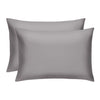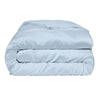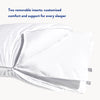The Daily Miracle
Why Do I Wake Up Tired After 8 Hours of Sleep?
Published
August 31, 2025
Author
Suze Dowling

Waking up groggy and worn out, even after a full eight hours in bed, can leave you wondering why you're still dragging through the day. If you've been asking yourself, "Why do I wake up tired after 8 hours of sleep?" you're not alone—so many people face this frustrating issue, even when they think they're doing everything right. This article dives into the most common reasons for waking up tired, how things like stress and lifestyle choices might be messing with your rest, and practical tips to improve sleep quality. Ready to uncover what’s holding you back from feeling refreshed? Let’s get started with simple steps you can take tonight.
What Is Restorative Sleep?
Restorative sleep is about more than just logging enough hours; it’s about the quality of your sleep. During this vital process, your body and mind actively repair and rejuvenate themselves. Your brain eliminates toxins built up during the day, your muscles recover, and your immune system gets stronger. When you enter deep, uninterrupted sleep, you wake up feeling alert, refreshed, and ready to go. On the flip side, even a solid eight hours can leave you feeling groggy if your body hasn’t finished these essential recovery steps.
What Are the Benefits of Restorative Sleep?
-
Enhanced Cognitive Function: Restorative sleep helps sharpen your focus, memory, and ability to learn, boosting performance at work or school.
-
Improved Mood Regulation: Adequate restorative sleep stabilizes your emotions, leaving you less irritable and reducing the risk of anxiety or mood disorders.
-
Stronger Immune System: Your body produces proteins during restorative sleep that help combat infections and inflammation, keeping you healthier overall.
-
Physical Recovery: It’s critical for rebuilding and repairing muscles, which is especially important if you’re active or exercise regularly, and sleep plays a vital role in this process.
-
Better Physical Health: Quality sleep consistently reduces the risk of chronic illnesses like heart disease, diabetes, and obesity.
Why Do I Wake Up Tired After 8 Hours of Sleep?
Ever wake up feeling drained and experience tiredness despite spending eight hours in bed? It's a common issue, and it's often linked to sleep debt and poor sleep quality rather than the amount of time you're asleep. Disrupted sleep cycles, underlying health problems, or even poor sleep habits can affect your circadian rhythm and stop you from reaching those deeper, restorative sleep stages. Essentially, it boils down to quality over quantity. If your body and mind aren't completing their overnight "recharge," you’ll wake up feeling tired no matter how long you sleep. Tackling these root causes is essential to unlock truly restful sleep.
What Are the Signs I’m Not Getting Quality Sleep?
If waking up tired wasn’t enough of a clue, there are other signs that point to poor sleep quality, such as symptoms of depression. You might feel drowsy during the day, struggle to concentrate, or notice yourself becoming more irritable. Heavy reliance on caffeine, forgetfulness, or even physical issues like headaches or muscle aches can all indicate your sleep isn’t cutting it. Are you feeling clumsy or getting sick more often? These too can signal your body isn’t recovering properly overnight. Simply put, your body is trying to tell you it needs better rest.
Can Stress and Anxiety Cause Morning Fatigue?
Absolutely. Stress and anxiety are major culprits when it comes to poor sleep quality. When you're stressed, your body produces cortisol, which keeps you alert—great for deadlines, but not for bedtime. Elevated cortisol can keep you from falling into the deep, restorative sleep stages. Even if you are sleeping for eight hours, your overall wellness might still suffer due to light or fragmented sleep. Over time, chronic stress can snowball into insomnia or other sleep problems, leaving you feeling tired and drained each morning. Simple stress-busting strategies like meditation, gentle yoga, or journaling can work wonders for both your mind and your rest.
Is My Diet Affecting My Sleep and Energy Levels?
Your diet absolutely impacts your sleep and how energetic you feel during the day. Sugary snacks or drinks before bed can cause blood sugar spikes and crashes, disrupting your rest. Similarly, heavy meals close to bedtime can lead to digestive troubles, making it harder to fall asleep peacefully. Missing out on important nutrients like magnesium or potassium can throw off your sleep cycles, too. For better sleep and to reduce fatigue, stick to whole, nutrient-rich foods and steer clear of caffeine and alcohol before you hit the sack.
Could a Sleep Disorder Be the Reason I Feel Tired?
It’s possible. Undiagnosed sleep disorders are a hidden cause of tiredness and fatigue for many people. Conditions like sleep apnea, where breathing repeatedly stops and starts during the night, prevent your body from entering deep sleep stages and can cause sleep inertia upon waking. Other issues, like restless legs syndrome or insomnia, also make you feel tired by interfering with restorative sleep. If you’re suspecting something more serious might be going on, it’s worth checking in with a doctor for a proper diagnosis—there are effective treatments that can help.
Establishing a Healthy Sleep Routine
-
Set regular sleep-wake times: Aim for 7–9 hours of sleep per night, and try to go to bed and wake up at the same time every day—even on weekends, as consistent sleep patterns are crucial for regulating your body's internal clock. This consistency helps regulate your body’s internal clock.
-
Create a relaxing bedtime environment: Make your bedroom dark, quiet, and cool. Upgrade your essentials with Miracle Made Sheets, Pillowcases, and a Comforter designed with temperature-regulating, silver-infused fabrics that help keep your bed fresh, clean, and perfectly balanced for sleep.
-
Wind down without screens: Avoid screens like phones, tablets, and TVs at least 30–60 minutes before bed—their blue light can suppress melatonin and disrupt your natural sleep cycle. Instead, create a calming ritual: take a warm shower with Miracle Made Shower Steamers, then step into a breathable Miracle Made Gauze Robe. Read, meditate, or listen to calming music to help your body transition smoothly into rest.
-
Block out disruptions: For uninterrupted rest. Consider the Satin Eye Mask. Its breathable satin and padded straps block light without adding pressure, creating the dark environment your body needs to slip into deeper sleep.
-
Manage stress and anxiety: Practice stress-relief techniques such as journaling, yoga, or deep breathing before bed. Pairing these habits with a clean, fresh sleep setup, like Miracle Made Bedding, can make it easier to unwind and relax.
-
Maintain clean sleep habits: Keep your sleep environment fresh with simple habits like rotating sheets and pillowcases less often—thanks to silver-infused fabrics that stay fresher longer. Support this with Miracle Made Laundry Detergent Sheets, an eco-friendly way to care for your bedding without harsh chemicals.
Common Mistakes and Expert Tips for Achieving Restful Sleep
-
Avoid caffeine and alcohol before bed—they can interfere with deep sleep stages.
-
Skip heavy meals close to bedtime to avoid digestion issues, which can disrupt sleep.
-
Don’t rely on your phone or tablet as a “wind down” tool; blue light delays melatonin and affects your sleep.
-
Avoid vigorous exercise right before bed, as it can energize rather than help you prepare for sleep.
-
Keep naps short (20 minutes or less) and avoid late-afternoon naps that disrupt nighttime sleep.
When Should I Consider Getting Tested for Sleep Apnea?
If you snore loudly, experience pauses in breathing during sleep, or struggle with excessive daytime sleepiness, morning tiredness, and fatigue, it might be time to consider a sleep apnea test. Morning headaches, difficulty concentrating, or high blood pressure are also red flags. Left untreated, sleep apnea can lead to serious health problems like heart disease or diabetes. A sleep study, done at home or in a lab, can give you clear answers and guide you towards treatments, such as CPAP therapy, that can restore both your sleep and energy levels.
Conclusion
Feeling your best begins with restorative sleep. From managing stress to upgrading your sleep environment, these small yet meaningful lifestyle tweaks can transform your daily energy levels. If you’re ready for cleaner, fresher, and more comfortable rest, explore Miracle Made Sheets, Pillowcases, or a Comforter to take your sleep routine to the next level. When you sleep better, you wake better.
Sources:
Do you actually need 8 hours of sleep every night?


























